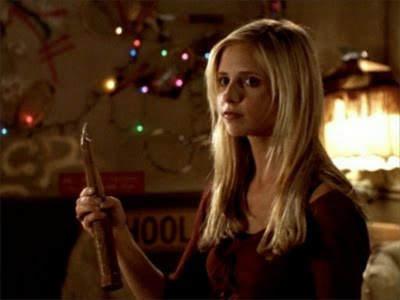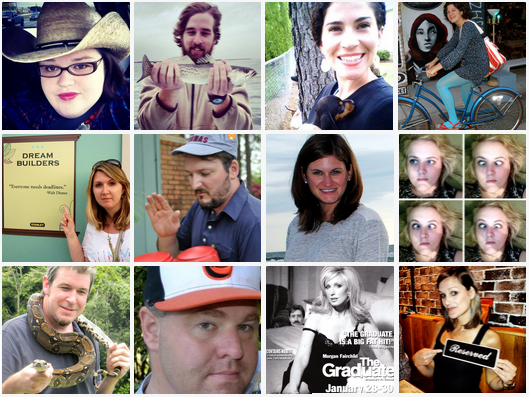
Writers see ourselves everywhere. That’s partially because we’re narcissistic, but mostly because our lives consist of writing and thinking about writing. Buffy the Vampire Slayer may not be about writers per se, but it has its moments.
1. Adam: “You are immortal, and yet you fear death more than those to whom it comes naturally.” (4.16)
Adam calls vampires a paradox. Immortality is within their reach, but one stake to the heart or one well-placed match, and it’s all gone. Immortality is no good if you’re killed before you make it out of the gate.
Writers are a paradox, too. Each piece we write is an extension of ourselves. Our legacy is in our work. Our words make us immortal. And the very fact that immortality is within our grasp makes us fear failure even more. What if no one likes my work? What if my book isn’t read after I’m gone (or while I’m alive). The desire for immortality sits on one shoulder with a halo, while the fear of leaving nothing but a sheaf of unread poems brandishes a pitchfork on the other.
2. Willow: Well, what, uh, what should I do? The, the play’s gonna start soon, and I don’t even know my lines.
Tara: The play’s already started. That’s not the point. (4.22)
Willow’s nightmare in “Restless” is of being in a play and not knowing her lines. Being the person who writes the lines is no less terrifying, and our job isn’t even live. We get to revise, edit, and proofread, but we still worry about making the wrong move or saying the wrong thing. And then, if we do our job exactly right, there is the possibility that someone will rip off our clothes and expose the part of us that wears a box-shaped dress and white tights. Because we’re all hiding some kind of past between the lines of our stories.
3. Buffy: “Being a Slayer doesn’t give me license to kill.” (6.2)
Being a writer doesn’t give us license to kill, either. Oh, but it does. It definitely does. Our poor characters haven’t done anything to deserve it. At the very least, they haven’t done anything to us. And yet, our search histories are full of, “undetectable poisons” and “deaths using modern technology.” If being the all-powerful creators of our own universes don’t give us license to kill, what does? (Sorry, not sorry, characters.)
4. Buffy and Giles have a good laugh. (6.22)
When Giles returns, Buffy gives a speech about the stress they have been under in Sunnydale: “Xander left Anya at the altar, and Anya’s a vengeance demon again. Dawn’s a total klepto. Money’s been so tight that I’ve been slinging burgers at the Doublemeat Palace. And I’ve been sleeping with Spike.” Instead of being upset or letting the burdens weigh on him, Giles laughs.
Writers have to laugh at ourselves sometimes. We can’t all be as funny as Xander, but just think what good it would have done for Angel to stop brooding long enough to crack a joke at his own expense. Maybe Buffy wouldn’t have had to push him into that hell dimension. Writers can be crazy and quirky. Our feet aren’t always settled in reality—sometimes the pull of our imaginations are is just too strong. We have to laugh at our silliness and our obsessiveness.
5. Buffy: “The stake is not the power…” (7.1)
Buffy says this to Dawn while teaching her to defend herself against vampires. Phallic symbols aside, the pen is not the power. What we write with it is. The keys, the ink, the quill, the marker, the crayon—they have nothing to say. A writing utensil never started a revolution, but the words flowing from it did.
Writers are strongest when we wield our “stakes,” but remember that we are the weapons. We create words, and words create change. Buffy could have given her stake to someone else, but vampires would not have been slayed.
6. Joyce: “There are some things you can’t control. The sun always goes down. The sun always comes up.” (7.10)
There are twenty-four hours in a day. We will never be able to make more. No matter how much we beg, cry, or pray to the muses, the sun will rise and set on its own schedule. We are the creators of our characters’ worlds, but unfortunately, the one in which we live maintains its own rules. That means we write, as quickly and as meaningfully as we can, and we hope that we have done enough by the time the sun sets (or possibly by the time the sun rises, if you’re one of those night-writers).
7. Giles: “And don’t worry, everyone here understands that you’re calling the shots.”
Buffy: “I just hope I’m calling the right ones.” (7.10)
Our characters look to us for guidance. Yes, they fight us sometimes. They question our leadership. I told you to cry; why are you laughing? But in the end, we decide their fates. We birth them, kill them, give them homes and families, send them to fight evil overlords, and sacrifice them to please the demon living beneath their town.
We try to do right by them (or at least by the story), but we’re never quite sure if we’re making the right calls. We don’t know if things are going to turn out right in the end (especially us pantsers). But we hope they do. We hope we can write The End and watch Sunnydale crumble into the Hellmouth.
8. Buffy: “From now on, we won’t just face our worst fears. We will seek them out.” (7.2)
Natalie Goldberg said, “Write what disturbs you, what you fear, what you have not been willing to speak about. Be willing to be split open.” Every time we write, we risk a piece of ourselves. We dig our pens into our chests and pluck out bits of our hearts, pulling from the dark places where our fears live. We spend a lot of time in those dark places. Our daydreams are often day-terrors. We study that fear inside ourselves so that we can write the human soul. It’s not enough to face our fears when they come to us. It’s not enough for Buffy to face the Ubervamps when they claw their way out of the Hellmouth. She and the Scoobies need to crawl down there and face them (with Spike’s help, of course). We have to seek them our fears and destroy them—or put them to paper. Hopefully we each have a Spike in our lives, who’s willing to go the distance.
9. When Buffy buries Chloe (7.15)
We work on our stories. We pour over them, writing and rewriting, revising, editing, proofreading, scrapping the whole thing and starting again. And we hope we make them strong enough to face the creatures of the night. But that’s not always the case. Sometimes we lose one. We all have manuscripts stashed away in drawers and old stories hidden in that deep dark part of our hard drive. We loved them, but it wasn’t enough. We have to say goodbye and move on—make sure our current works in progress learn from the death of their comrade.
Buffy tells the other potentials, “Chloe was stupid. She was weak. And anyone in a rush to be the next dead body I bury, it’s easy. Just…think of Chloe, and do what she did.” At first, the potentials are hurt and angry, but eventually they do learn from Chloe’s mistakes. And so does Buffy. Our works in progress may not be happy about it, but they will learn, and so will we.
10. Andrew’s documentary in “Storyteller” (7.16)
Andrew truly lives the writer’s life. Rona says, “If we save the world, it would be kind of nice to have a record of it.” Andrew documents the fight against the First on film. Buffy rebukes him for it, but he doesn’t let that stop him. Andrew is quirky and has the capacity for evil, but Buffy fans know he’s good at heart. He just wants to leave a legacy and tell a story. Isn’t that all any of us want?
We fight our daily demons and hopefully destroy some of them. A few turn out to be good, after all, but we learn from all of them. Each demon Buffy kills, each vampire she slays, gives Buffy the strength to defeat the ultimate evil. Each story we finish, each manuscript we pour our hearts into—whether we love it or despise it—is a stepping stone. As writers, we are never finished. Our story is never complete. In the immortal words of Buffy, “I’m cookie dough. I’m not done baking. I’m not finished becoming who ever the hell it is I’m gonna turn out to be” (7.22). We’re always baking and forming, as writers and as people. Each story we write, each fear we face, helps us to become fantastic cookies, whether we’re chocolate chip, oatmeal raisin, or frosted sugar. We all have a story to tell.
Quotes from BuffyWorld transcripts: http://www.buffyworld.com
Image: BtVS 4.1 (“The Freshman”)



